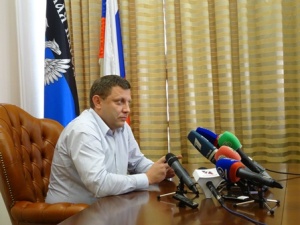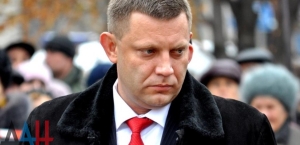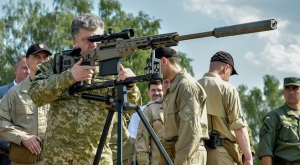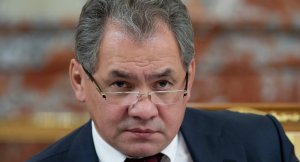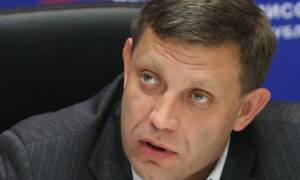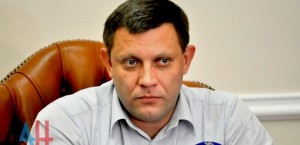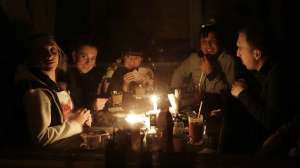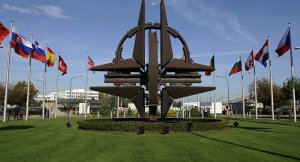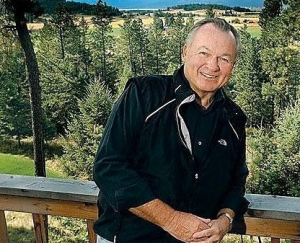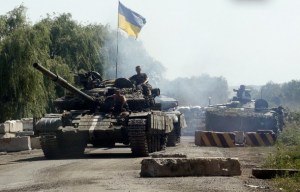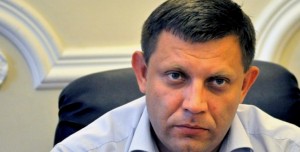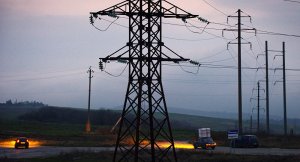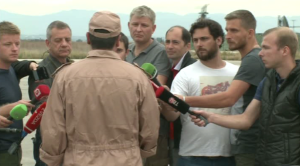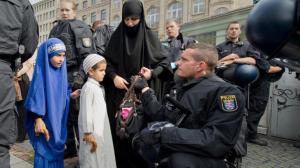Will Allies and Axis Join Ranks
A Century Later?
Introduction by Quemado Institute
November 27, 2015
As
the world news zeroes in on the hidden---or ot so hidden---subversive
financial motives for Turkish President Recep Tayyip Erdogan's shootdown
of the Russian SU-24 and his criminal support of the Islamic State, the
more progressive countries of the West are at last waking up to the
fact that Vladimir Putin is ten steps ahead of them in combatting the
biggest threat to our civilization: extremist Islamic terrorism.
We present below four articles from news platforms on different sides of the curtain: first a report from
Strategic Culture Foundation on the Putin-Hollande press conference, followed by guest reports form
rt.com,
Aljazeera and the
Washington Post,
each underscoring the urgency of forging an alliance between Europe
and Russia, which, unlike the alignment in the World Wars of the
twentieth century, would include Germany in its ranks, despite that a
stubborn NATO insists on digging its head in the sand, no doubt fearing
its officials will be out a cushy job if the quasi-Russian-Atlantic feud
is exposed as the robeless emperor it is.
.
Vladimir Putin, Francois Hollande Press Conference
Guest Article
Strategic Culture Foundation November 27, 2015
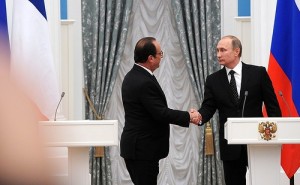 |
| Francois Hollande, Vladimir Putin, Moscow, Nov 26, 2015 |
On
Nov 26 following their bilateral meeting in Moscow, the President of
Russia Vladimir Putin and the President of France François Hollande took
part in a press conference in Kremlin to give a statement on the
results of the meeting and answer journalists’ questions. Mr. Putin
started his address by calling the concluded meeting “frank and
substantive” and naming “the issue of jointly combating international
terrorism” as its primary objective.
“Russia and France know what
it means to act in the spirit of alliance; we have come together more
than once throughout our history. Today, we agreed to step up our joint
efforts on the anti-terrorist track, to improve the exchange of
operational information in the fight against terrorism and establish
constructive work between our military experts in order to avoid
overlapping incidents and to focus our efforts on ensuring that our work
in fighting terror is more effective, avoiding any strikes against
territories and armed forces that are themselves fighting terrorists. Mr
Hollande and I are looking at this kind of cooperation as concrete and
practical input towards forming a broad anti-terrorist coalition, a
broad anti-terrorist front under the auspices of the United Nations. I
will note that the number of nations sharing this initiative is
growing.” noted the President.
Following the opening speech
delivered by Vladimir Putin President Hollande stated: “Last week, the
UN Security Council unanimously adopted a resolution that all countries
in the world should take the necessary measures to coordinate their
efforts to eliminate the 'Islamic State', and we should pursue this
process. …Since 2011, the chaos in Syria has created a huge wave of
refugees, and over 300,000 people have been killed, and so now we need
to find a political solution to this crisis, but there are requirements
for this that should be followed. We believe that the following
conditions should be met if we are to ensure a political transition
process. A coalition government, an independent government, should be
formed during a transition period. … it is imperative that Russia should
play the main, one of the main roles in this process. I’ve told Mr
Putin that France is ready and willing to work with Russia hand in hand
towards our common objective, which is to fight terrorist groups, above
all ISIS. It is for this reason that I believe our meeting today to be
of outmost importance. Mr Putin and I have agreed on three main points.
"First,
we intend to step up the exchange of intelligence and any other
information between our respective forces. Second, we will intensify
strikes against ISIS and coordinate them so as to enhance their
efficiency. Third, as Mr Putin has also pointed out, we need to make
sure that our air strikes concentrate on the 'Islamic State' and
terrorist groups.
"Let me tell you that Europe is about to
mobilise its forces to combat terrorism. I would like to ask defence
ministers from across Europe to take the necessary decisions for
coordinating their actions. The United Kingdom will also participate. I
spoke with Mr Cameron about this. I also discussed a number of issues
with Ms Merkel yesterday. Mr Putin and I have also agreed that we will
exchange information and specific actions as regards another important
issue – the developments in eastern Ukraine. We will continue to work on
that within the Normandy format. Our fight against terrorism in Syria
does not affect France’s commitment to find a political solution to the
Ukrainian crisis. We must fully implement all the measures that are
stipulated in the Minsk Agreements. This is why I wanted to come to
Moscow today to meet with Mr Putin. Mr Putin will come to Paris on
Monday to participate in the climate change conference. I think the
current situation and the fight against terrorism required my visit to
Moscow today.”
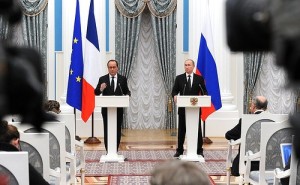
Answering
a question about the role of President Assad in the future of Syria,
President Putin replied: “I believe that the fate of the Syrian
president should be entirely in the hands of the Syrian people. This is
the first point. Second, we all believe that successfully fighting
terrorists in Syria is impossible without ground operations, and today
the only force that can conduct ground operations against ISIS, Jabhat
al-Nusra, and other terrorist organisations, is the Syrian government
army. In this regard, I believe that President Assad's army and he
himself are our natural allies in fighting terrorism. There may be other
forces that claim they are willing to fight terrorists. …We have
already established such contacts with some of them, and … we are
willing to support their efforts in fighting ISIS and other terrorist
groups, just as we support the Assad army.
"We …will exchange
information with France about the areas that are being held by healthy
opposition, not terrorists, and will refrain from delivering air strikes
at them. We will also exchange information, when we – France and Russia
– know for sure that certain areas are captured by terrorist
organisations, and we will coordinate our efforts with regard to those
areas.”
When asked about the incident that took place on Tuesday
as a result of which a Russian bomber was shot down by Turkish jet
fighters and possible implications of the incident, Vladimir Putin
stated: “…we considered Turkey to be a friendly state and simply didn’t
expect an attack from that side. This is why we regard this attack as
treacherous. Now we see what’s possible, and our people were killed.
We’re duty bound to ensure the safety of our air force. This is why
we’ve deployed the modern S-400 system there. It’s a long range
air-defence system and is one of the most effective such systems in the
world. However, we won’t limit ourselves to this. If necessary, we’ll
support our air operations with fighter jets, and any other means,
including electronic warfare systems. We have plenty of alternatives,
and now we’ll use them.
"This is not in conflict with what we’re
doing with the US-led coalition. We exchange information with them, but
now we’re very worried about the nature of this exchange and the results
of this cooperation. …The American side, which leads the coalition, to
which Turkey is also a party, knew about the location and time of our
operation. And this is precisely where we were hit. …We considered
Turkey not just a neighbour, but a friendly nation, almost an ally. It
is very sad to see this being destroyed in such a thoughtless and
reckless manner. … It’s highly regrettable that instead of seriously
analysing this issue and making sure that such incidents never happen
again, we are hearing inconclusive explanations and statements that they
don’t have anything to apologise for. Anyway, this is Turkey’s choice,
not ours.”
Mr Hollande also offered his comment on the issue:
“This is a very serious incident, and I regret that it happened. It is
perfectly clear that it is necessary to avoid any risk and any possible
repetition of this sort of thing at this time and place. It is critical
that we refrain from escalating the situation. The only goal that we
should all set for ourselves is the fight against ISIS and the
elimination of the terrorists. We have no other goals. We must enhance
coordination between our countries so that the armed forces present in
the region and the aircraft capable of conducting air strikes do not
interfere with each other so as to prevent any encounters leading to
deplorable consequences and collisions. We need to do our outmost to
prevent this from happening again.
"…we have agreed on the need to
carry out strikes against terrorists only, only against ISIS and
jihadist groups. It is crucial in this respect that groups that are also
combating terrorists are not targeted by air strikes. It is in this
area that we intend to share information with each other, as was
discussed during the meeting. We have to understand who can fight and
who can’t, who should or should not be targeted. Consequently, our
current objective is to try to avoid any incidents of this kind between
the countries that are engaged in counter-terrorist efforts in Syria.
Second, we must identify goals that would be clear to everyone.”
.
Anti-ISIS Bombing Hits Commercial-Scale Oil Smuggling to Turkey
Guest Report
Axis of Logic Source: rt.com
November 27, 2015
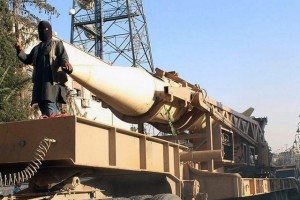 |
| ISIL uses oil smuggling to fund war chest (--thenational.ae) |
Islamic
State’s daring and impudent oil smuggling into Turkey should become a
high-priority target in order to cripple the terrorist group, President
Putin said, backed by French President Francois Hollande. Both agree
that the source of terrorist financing must be hit first and foremost.
Commercial-scale oil smuggling from Islamic State controlled territory
into Turkey must be stopped, Putin said after meeting Hollande in
Moscow.
“Vehicles, carrying oil, lined up in a chain going beyond
the horizon,” said Putin, reminding the press that the scale of the
issue was discussed at the G20 summit in Antalya earlier this month,
where the Russian leader demonstrated reconnaissance footage taken by
Russian pilots. The views resemble a “living oil pipe” stretched from
ISIS and rebel controlled areas of Syria into Turkey, the Russian
President stressed. “Day and night they are going to Turkey. Trucks
always go there loaded, and back from there – empty.”
“We are
talking about a commercial-scale supply of oil from the occupied Syrian
territories seized by terrorists. It is from these areas [that oil comes
from], and not with any others. And we can see it from the air, where
these vehicles are going,”
Putin said. “We assume that the top
political leadership of Turkey might not know anything about this
[illegal oil trade]. Hard to believe, but it is theoretically possible,”
Putin said, adding that this however does not excuse Ankara from not
stopping the illegal smuggling of oil.
Putin pointed out the lack
of smoke from any fires or the existence of any commercial enterprises
created to deal with the destruction of oil, which would be possible to
find if the Turkish leadership is aware and is seizing and destroying
smuggled products, as it claims. “But if the top political leadership
[in Turkey] doesn’t know anything about this, let them find out. I can
admit that there may be some elements of corruption, secret dealing,
they should sort it out,” said Putin.
Putin stated that sales of
oil from ISIS are in direct violation of international law, and that the
proceeds from ‘black gold’ cost innocent people their lives. “In this
respect there is a special UN Security Council resolution banning the
direct purchase of oil from terrorists, because these barrels, that they
supply, it is not just oil, there is the blood of our citizens, because
from the money [received], terrorists buy weapons, ammunition, and then
conduct bloody actions,” Putin said.
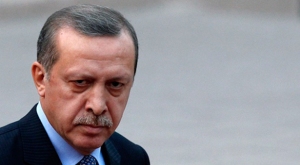 |
| Recep Tayyip Erdogan (--sendika7.org) |
However,
the Turkish leadership is not rushing to investigate whether any of the
ISIS oil smuggling routes end up in Turkey, with President Recep Tayyip
Erdogan himself refuting any suspicions that Syrian oil might be
getting into his country illegally as absolute “slander.”
“Those
who claim we buy oil from Daesh [ISIS] are obliged to prove it,” Erdogan
said earlier on Thursday in an attempt to shift the blame for ISIS oil
profits onto Damascus. “If not, you are a slanderer. Shame on you!”
“ISIL sells the oil they drill to Assad. To Assad. Talk this over with Assad you support,” Erdogan said, as cited by AFP.
Putin
reminded that ISIS claimed responsibility for a number of deadly
terrorist acts throughout the world, including the Russian plane bombing
in Sinai and the series of Paris attacks in mid-November.
After
French President Francois Hollande’s meeting with Putin on Wednesday, he
said that the focus of the fight against terror should be the
destruction of the Islamic State oil trade. “It is necessary to hit ISIS
training centers, to hit those centers where this terrorist army is
being trained,” Hollande said. “But the main thing is to hit the sources
of financing, which give [the terror group] life in the first place –
first of all oil,” The French leader emphasized. The most effective way,
the French leader said is to target “trucks that transport oil,”
transferring it to buyers on the black market, “thus giving ISIS
uncontrolled amount of money.”
The Russian Foreign ministry
meanwhile wants Ankara to properly address reports of its alleged
involvement with ISIS oil smuggling. “We have a very large number of
questions ... [for] the Turkish side in relation to information found in
the media and social networks about the relationship with the
terrorists on the oil business, all kinds of assistance to groups that
carry out the relevant activities,” said Russian Foreign Ministry
spokeswoman, Maria Zakharova.
Meanwhile the Russian air force
continues to engage terrorist targets in Syria and increasingly focusing
on illegal terrorist oil smuggling. Between November 23 and26 the
Russian air force carried out 134 sorties on 449 targets. “Russian
aviation continues to strike refining facilities in the territories
controlled by ISIS terrorist organization,” defense ministry spokesman
General-Major Igor Konashenkov told a media briefing on Wednesday. In
the past few days Russian aircraft have destroyed oil trucks,
refineries, and oil storage facilities in the provinces of Deir ez-Zor
and Raqqa.
.
France’s Hollande, in Moscow, Calls for Anti-ISIL Coalition
Guest Report
Aljazeera November 26, 2015
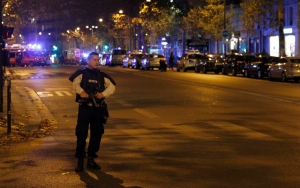 |
| Baumarchais, 11-13-15 (--Thierry Chesnot/Getty Images) |
French
President Francois Hollande told Russia's Vladimir Putin on Thursday that world powers must create a "grand coalition" to combat Islamic
State in Iraq and the Levant (ISIL) fighters who control swathes of
territory in Syria and Iraq. Hollande’s comments come amid calls from
international leaders to ramp up efforts against ISIL in the Middle East
and around the world following the attacks in Paris on Nov. 13 that
killed 130 people. ISIL has also said it downed a Russian plane on Oct.
31 over the Sinai Peninsula in Egypt, killing all 224 people on board.
"Our enemy is Daesh, Islamic State, it has territory, an army and
resources, so we must create this large coalition to hit these
terrorists," Hollande said, using alternative names for ISIL, in
televised remarks at the start of bilateral talks with the Russian
leader in the Kremlin.
Putin said that Russia was mourning for
Paris victims and those who died in the downing of the Russian passenger
plane over Egypt. He praised Hollande's efforts to build a coalition
and said that Moscow was open for stronger cooperation. “It is for [the
victims of the attacks] that we must act,” French newspaper Le Figaro
quoted Hollande as saying.
Earlier Thursday, British Prime
Minister David Cameron told the House of Commons that U.S. President
Barack Obama and French President Francois Hollande had urged Britain to
join the military campaign and argued that the Paris attacks have given
new urgency to the fight against ISIL. "These are our closest allies
and they want our help," he said.
Cameron, who lost a vote on air
strikes against Syrian President Bashar al-Assad's forces in 2013, needs
to persuade several lawmakers in his own Conservative Party and some in
the opposition Labour Party to back his cause if he is to win
parliament's backing for military action.
Germany, meanwhile, has decided to send reconnaissance aircraft, tanker planes and a warship to help in the fight against ISIL.
Hollande's
visit comes two days after he met with President Barack Obama in
Washington, where both leaders vowed to escalate airstrikes against ISIL
and bolster intelligence sharing. Hollande's difficult task became even
more arduous after Turkey shot down a Russian warplane near the Syrian
border on Tuesday. The incident underscored the complex military
landscape in Syria, where a sprawling cast of countries and rebel groups
are engaged on the battlefield and in the skies overhead, sometimes
with minimal coordination.
The French president hopes to make
progress on three priority issues: to prevent Assad from targeting
civilians, to focus the airstrikes on ISIL fighters – not other groups
that comprise the Syrian opposition – and to move forward on a political
transition in Syria. France will also seek to "avoid an escalation"
between Russia and Turkey, according to a French diplomatic official who
spoke on condition of anonymity because of the sensitivity of the
issue. In advance of Hollande's meeting with Putin, France sought to
dismiss concerns that it might soften its stance on international
sanctions against Russia over Ukraine in exchange for Russia's
cooperation in the fight against ISIL. France's ambassador to the U.S.,
Gerard Araud, tweeted on Tuesday evening that "Hollande has confirmed
the sanctions will be maintained as long as the Minsk agreements are not
implemented." Araud was referring to peace agreements for eastern
Ukraine forged in the Belarusian capital in February.
Following
his meeting with the French president, Obama said Russian cooperation in
the fight against IS would be "enormously helpful." Both Obama and
Hollande, however, insisted that a political transition in Syria must
lead to Assad's departure. Russia, on the other hand, has been Assad's
staunchest ally. Last week, Hollande called for the U.S. and Russia to
set aside their policy divisions over Syria and "fight this terrorist
army in a broad, single coalition." But his office acknowledges that
"coordination" sounds like a far more realistic goal.
With two
suspects of the Paris attacks at large, tensions were still high in
Belgium on Thursday with the capital, Brussels. But authorities lowered
the threat level in Brussels to the second-highest level.
Since
Saturday morning, Brussels – home to the European Union and NATO
headquarters – had been wary of a threat that was considered "serious
and imminent." The lowering of the threat level came as a surprise,
since the government had said that it would likely keep the highest
threat level in the capital through the weekend. Authorities launched a
raid in southern Belgium on Thursday afternoon linked to the Paris
attacks, but didn't detain any suspects.
In Brussels, a civil
protection squad decontaminated several people as a precaution at the
main mosque after a suspicious parcel arrived. The person who opened the
package discovered white powder and immediately contacted authorities. A
specialized crew from the fire department was sent, witnesses at the
scene said.
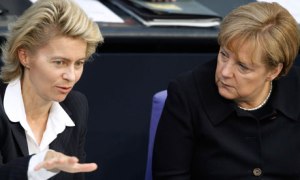 |
| Ursula von der Leyen, Angela Merkel (--theguardian.com) |
In
Germany, Chancellor Angela Merkel's Cabinet decided in the wake of the
Paris attacks to send reconnaissance aircraft, tanker planes and a
warship to help in the fight against ISIL. Defense Minister Ursula von
der Leyen told reporters that the government had also agreed to provide
satellite surveillance. During Merkel's visit in Paris on Wednesday,
Hollande had said it would "be a very good signal in the fight against
terrorism" if Germany could do more against ISIL in Syria and Iraq
Von
der Leyen said the warship would help protect France's aircraft carrier
in the eastern Mediterranean and the tanker planes could help refuel
French warplanes in the air. The satellite surveillance could provide
important information on IS and also help protect civilians with precise
information. The reconnaissance aircrafts will also support France in
its fight against Islamist extremists. The decision still needs
parliamentary approval, but it was expected to not meet much resistance
by lawmakers.
.
Hollande, on Moscow Visit, Calls for
Broad Anti-ISIS Coalition
Guest Report
Tampa Bay Times
Source: Washington Post
November 26, 2015
MOSCOW
— Russian President Vladimir Putin late Thursday said he was ready to
coordinate strikes against the Islamic State with the United States and
its allies. After talks with French President François Hollande at the
Kremlin, Putin said, "We are ready to cooperate with the coalition which
is led by the United States." It was the most forthright commitment to a
joint effort between Russia and the West since Moscow's seizure of
Crimea from Ukraine in 2014.
But it was far from the declaration
of a new grand coalition in Syria, potentially under United Nations
auspices rather than American leadership, that Putin has proposed. The
deep disagreement between Russia and the West over the future of the
embattled Syrian president, Bashar Assad, has not been put aside.
Hollande
said France was ready to fight alongside Russia but added, "Of course,
Assad cannot play any role in the future of this country." Since Russia
intervened in Syria two months ago, Moscow and Washington have agreed on
measures to "de-conflict" their aerial operations there. But as each
country pounds its targets in Syria, they have not worked in tandem in
any way.
Hollande arrived in Moscow after meeting with President
Barack Obama earlier this week. The terrorist attacks in Paris on Nov.
13 have led France to step up its operations in Syria and to seek some
sort of workable agreement among the foreign powers involved there. The
idea has not been warmly embraced by the United States, which has
accused Russia of targeting Assad's foes among the American-backed
rebels, rather than the Islamic State, also known as ISIS. Hollande said
that he and Putin had agreed "to only carry out strikes against
terrorists, only against ISIS, and only against jihadist groups."
"It is important not to strike those groups who are also fighting against terrorists," he said.
Putin
has long argued that the Western powers, Russia and China all face a
common Islamist threat, and he has made it clear that he resents what he
sees as relative Western indifference to attacks on Russia. He also has
suggested that the United States has been negligent in taking the
Islamist threat seriously enough.
The Paris attacks occurred
shortly after a bomb brought down a Russian airliner on its way from
Egypt's Sharm el-Sheikh resort to St. Petersburg, killing all 224
aboard. On Thursday, Putin and Hollande commiserated over the those
attacks. The occasion gave Putin an opportunity to reiterate his
argument about the common threat and about the need for the major powers
to act in concert.
Putin has emphasized the fight against global
terrorism as a means to repair, or at least re-establish, a meaningful
partnership with the West. "Our positions are the same," Putin told
Hollande before they began their private talks. "That forces us to join
our forces in fighting terrorists. We are prepared to work with you, Mr.
President."
Hollande said, "I am in Moscow with you to figure out
how we can act together in order to coordinate our actions to hit this
terrorist group and look for political solutions for Syria." Putin also
said that he and Hollande had agreed on "how we will cooperate in the
near future, on a bilateral basis and with, as a whole, the coalition
led by the United States." That would include where to launch strikes,
Putin said.
In London, British Prime Minister David Cameron on
Thursday argued the case for extending Britain's airstrikes targeting
ISIS to Syria, telling Parliament that the group posed a "fundamental
threat" to the security of Britain and that the United Kingdom should
not "wait until an attack takes place here." He added that British
police and security services have foiled seven plots over the past year
either linked to ISIS or inspired by its propaganda. Cameron told
Parliament that if Britain won't act "when our friend and ally France
has been struck in this way, then our allies in the world can be
forgiven for asking: If not now, when?"
With two suspects of the
Paris attacks at large, tensions were still high in Belgium on Thursday
in the capital, Brussels. But authorities lowered the threat level in
Brussels to the second-highest level.
Since Saturday morning,
Brussels — home to the European Union and NATO headquarters — had been
wary of a threat that was considered "serious and imminent." The
lowering of the threat level came as a surprise, since the government
had said that it would likely keep the highest threat level in the
capital through the weekend. Authorities launched a raid in southern
Belgium on Thursday afternoon linked to the Paris attacks, but didn't
detain any suspects.
In Brussels, a civil protection squad
decontaminated several people as a precaution at the main mosque after a
suspicious parcel arrived. The person who opened the package discovered
white powder and immediately contacted authorities. A specialized crew
from the fire department was sent, witnesses at the scene said.
In
Germany, Chancellor Angela Merkel's Cabinet decided in the wake of the
Paris attacks to send reconnaissance aircraft, tanker planes and a
warship to help in the fight against ISIS. Defense Minister Ursula von
der Leyen told reporters that the government had also agreed to provide
satellite surveillance. During Merkel's visit in Paris on Wednesday,
Hollande had said it would "be a very good signal in the fight against
terrorism" if Germany could do more against IS in Syria and Iraq.
.

